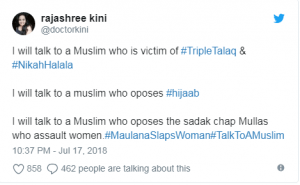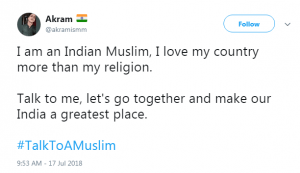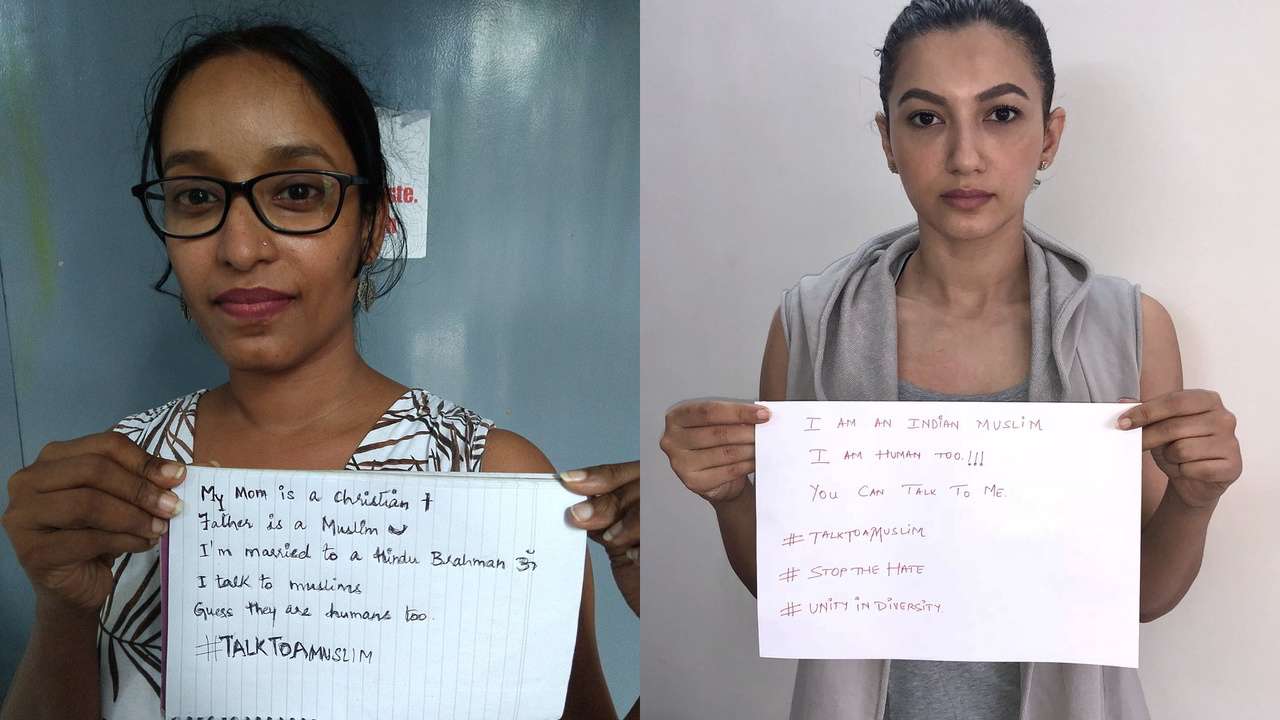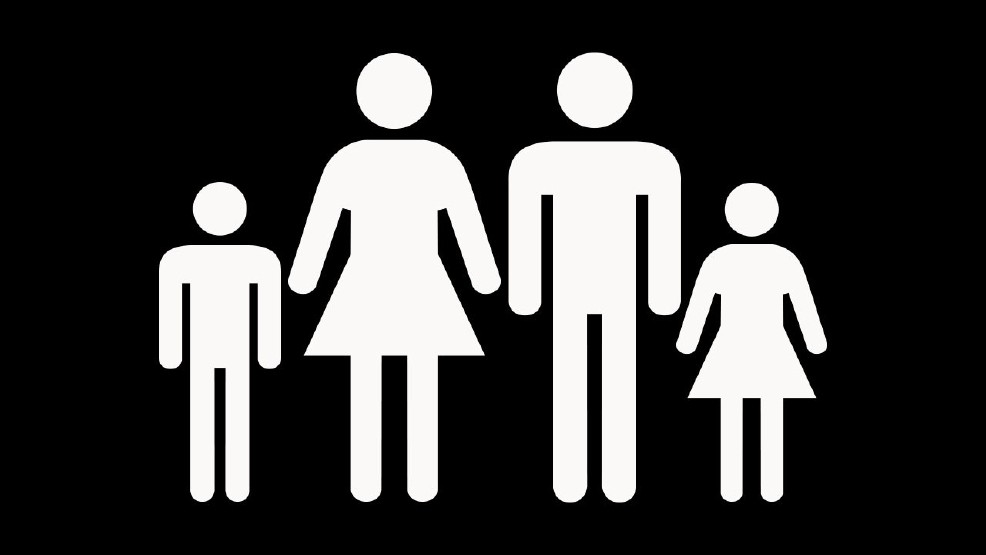When Opposition leader Rahul Gandhi met with Muslim leaders and activists, BJP attacked the Congress, calling it a ‘Muslim party‘. This prompted Zainab Sikander to come up with the hashtag #TalkToAMuslim. The idea was to destigmatize talking to Muslims, to ensure that the act doesn’t invite such hate or paranoia. It was widely supported by people like Swara Bhaskar, Gauhar Khan and Nazia Erum.
I'm An Indian Muslim.
I'm Human too.
You can talk to me.#TalkToAMuslim https://t.co/fvkYcWPday pic.twitter.com/lup88CjD2N— Zainab Sikander (@zainabsikander) July 17, 2018
A muslim man was BURNT ALIVE over a false claim of #LoveJehad & the perpetrator recorded it live & posted on social media with pride! OBVIOUSLY we need 2 remind a whole section of people that “Muslims are human too” – that is what’s on some streets in India today. #TalkToAMuslim https://t.co/lOf5L1cGCX
— Swara Bhasker (@ReallySwara) July 18, 2018
We have reached a #MeToo moment in the #TalkToAMuslim debate. There are no easy answers. Both sides have their point of views. Let there be peace 🙂
— Nazia Erum (@nazia_e) July 18, 2018
This seems to be an extension of and in consonance with #LoveAMuslimDay which was created in response to Punish a Muslim Day in the UK. A few months ago, an anonymous letter circulated in the UK which proclaimed that 3rd April 2018 would be celebrated as “Punish a Muslim Day” wherein people could receive points depending on the kind of hate crime they committed against Muslims.
The message here for #TalkToaMuslim is simple – there is nothing wrong with talking to a Muslim. In fact, if you do, personally you can undo your prejudices and collectively we can all benefit from listening to Muslim voices, especially in our insensitive media newsrooms.
Well-intentioned Muslim supporters of the movement argue that it is not an appeal to the majority, but a statement to claim an equal status, and an effort towards humanisation of a people. It seems perfectly understandable as to why Muslims, in response to everyday manufacturing of violent lies about them and insensitive headlines like ‘Hindu Khatre mein hain’ (Hindus are in danger), would want to be heard and not instead be represented by Maulvis who are seen to typify the entire community.
The criticism against it has also been completely misplaced. People have claimed that no such stigma exists in talking to Muslims. It has become another great opportunity for people to score brownie points by showing how diverse and tolerant they are. We don’t see religion, there is unity in diversity, and we even eat the sewaiyen our Muslim friends bring us on Eid.
Muslim supporters of #TalkToAMuslim argue that it is not an appeal to the majority, but an effort towards humanisation of a people.
You don’t need to talk to a Muslim to know that this is far from the truth. Stories of people refusing to or being hesitant to befriend Muslims in their personal life or of upper caste Hindus rejecting to eat in our houses (does anyone else remember the Red Label ad where the Muslim woman had to make amazing tea to be able to get her Hindu neighbours to like her?) are all too common.
Hence, on the face of it this seems like a harmless and extremely beneficial move. However, there was something deeply discomfiting about the whole exercise of it that I couldn’t get myself to reconcile with.
The argument that Muslims are ‘human’ too, and hence you can come and talk to us makes sense only when articulated as an attack to and a pacification of the conscience of those who’ve continuously dehumanised us. In this effort it asks for dignity on basis of kindness of others to listen to us and understand us. Unlike, say, #DalitLivesMatter or #AdivasiLivesMatter, it is not an independent assertion for rights or dignity. It assumes maybe once they see we’re not that bad, they’ll be nicer to us.
The criticism against it has been misplaced. ‘We don’t see religion, we eat the sewaiyen our Muslim friends bring us on Eid’.
It is not surprising to see despite the intentions of those who initiated it, the life and force the hashtag has assumed is different and in many cases, extremely dangerous. So many people have interpreted to claim that they’d only talk to Muslims who clearly oppose outdated practices like triple talaq, nikah halala and those who don’t are not worth their time or respect.

It is hard to see what exactly is so revolutionary about putting individual Muslims under the scanner and ask them to prove that they are not like the ‘medieval barbarian’ image people have in their heads. Given the way the language of the hashtag has been created, it is not surprising it has taken such a form.
#TalkToAMuslim becomes an easy way for people to indulge in their stereotypes about Muslims and ask us to correct them all. There is a great emotional burden attached to this exercise which we need to acknowledge.
It assumes maybe once they see we’re not that bad, they’ll be nicer to us.
The idea cannot be as simple as just being an apolitical movement to include Muslims through conversations. Can the mechanics surrounding listening and speaking really be apolitical? Maybe it is the simplicity of the idea that scares me the most. We fall for such low and basic standards that we forget to explore what kind of conversations actually follow – who ends up doing the talking and to whom?
We get your insecurities.#TalkToAMuslim @WajahatJilani @ReallySwara @zainabsikander pic.twitter.com/090vcdAMPm
— Ansab Amir Khan (@ansab_amir) July 18, 2018
It refuses to acknowledge the gaze through which Muslims are looked at in the aftermath of these conversations. We’ve all had experiences with people who wouldn’t ordinarily talk to us because we were Muslims, where once they do find out we are Muslims, invariably turn the conversation around towards us being their window into “understanding Muslim lives”.
This brought back the deep shame I felt as a child after my teacher inquired in front of my friends with disgust what was in my lunch box (it was delicious seekh kebabs) and made faces after I told her so. The discussion around the hashtag reminded me of all those times I had been spoken to as a Muslim and how upsetting those instances were. It is about how I have to constantly handle the disbelief and disgust of friends when I tell them I come from a Muslim family of five siblings. I can’t count the number of times after a parent teacher meeting that I had to tell my classmates that yes, these are my parents; yes, they dress this way and yes, I’m allowed to wear jeans.
#TalkToAMuslim becomes an easy way for people to indulge in their stereotypes about Muslims and ask us to correct them all.
These types of conversations demand us to be fragile, reckless and flexible with our stories They require us to be ready at all times to uncover details of our lives to debunk your stereotypes. There is no sanctity to our stories then. For you to take me seriously and not see me as another ignorant Muslim I have to tell you how hard my parents work for me and my education, and that having five siblings is actually pretty great.
With this hashtag you get an easy way to prove your inclusion, regardless of how those conversations may pan out, regardless of how tired we may be of proving to you our humanity by indulging in your stereotypes. It has become a self congratulatory exercise for everyone else. They can get rid of their guilt by talking to a Muslim and seeing we’re humans too. Who cares how reductive and dehumanising that might have been for us?
The first impression the use of the hashtag gave me was that of people trying to desperately find a ‘good Muslim’ they can accept. It is based on a certain imagination of a Muslim, albeit only a good Muslim. So many of such tweets seems to show Muslims as normal people who do everyday things and indeed love their nation. This incessant pressure on the marginalised to constantly prove their love for the country or show their decency is deeply concerning.

In order to counter the narrative of a ‘bad Muslim’ people take extraordinary measures to show and prove their loyalty, civility and patriotism. Can a true solidarity put the same pressures on Muslims or should it not re imagine more genuine ways of articulating support?
Maybe a good ally needs to be asked what comfort it gives their mind to see a Muslim who is so ‘human’ that they do normal things like reading Shakespeare. Why would you want to put this pressure on your friends to give you that sense of calm and affirmation?
I'm an Indian Muslim
I have fun,
I enjoy life
I can talk to you on Shakespeare, Ghalib, Meerabai, the Mughals and the First war of Indian independence
Of Muslim contribution to freedom struggle
Come talk to me#TalkToAMuslim #TalktoaMuslim pic.twitter.com/4qE6gP7nAQ— Rana Safvi رعنا राना (@iamrana) July 17, 2018
You shouldn’t have to know of all the regular, non-threatening things Muslims do in order to believe in their humanity. Maybe just believe in the ideal of what B.R Ambedkar called ‘moral equality’, which assumes the inherent equality and dignity of all. This of course doesn’t mean we ought to overlook our differences and not acknowledge the specific ways Muslims are being Otherised.
It assumes that Muslims have not been talking or articulating their problems, or that within us the women do not get to speak out. Is it not only a case of people forgetting to count our stories but a systematic exclusion of our voices. The situation is so much more sinister when you account for the kind of State support such collective hatred enjoys. There is little such a move can do to address the fear in someone when they look at Union minister Jayant Sinha garlanding those accused in another case of mob lynching.
With this hashtag you get an easy way to prove your inclusion, regardless of how tired we may be of proving to you our humanity by indulging in your stereotypes.
This situation of deep fear and anxiety cannot be something which can be wiped off by simple fact verification by talking to our Muslim friends about their authentic Muslim lives. You have to prioritize and include an honest discussion and analysis of an environment and society where such falsehoods and stereotypes find currency, interest and an audience.
The spread of blatant lies like 95% of rapists were Muslims by National Crime Records Bureau (NCRB), with their language and construction of Muslim as enemy have a specific motive of furthering hate. After a certain point you cannot simply blame the State or the ruling party, but have to ask how exactly the DNA of Hindu Brahmanical India is built to deliberately exclude others.
We need better ways of communication which go beyond apolitical concerns of ‘love and tolerance’. You need to clear space for Muslims to speak, instead of prioritising your position as a listener. You need to do better than subjecting Muslims to your ignorance.
Featured Image Source – DNA India
About the author(s)
Umara is pursuing her bachelors in history from St.Stephen’s college. Feminism to her is an evolving process, she doesn’t feel the need to define her version of it, because she comes from the belief of autonomy of the oppressed classes.





Take a look at any muslim majority country, and you’ll see what the problen is. KSA just recently passed a law that allows women to drive. People aren’t stupid. Its been 14 centuries, and we know exactly what Islam is and what it strives to achieve.People are afraid of muslims for a very good reason, and to call yourself both a muslim as well as afeminist; that right there is a perfect example of an oxymoron.